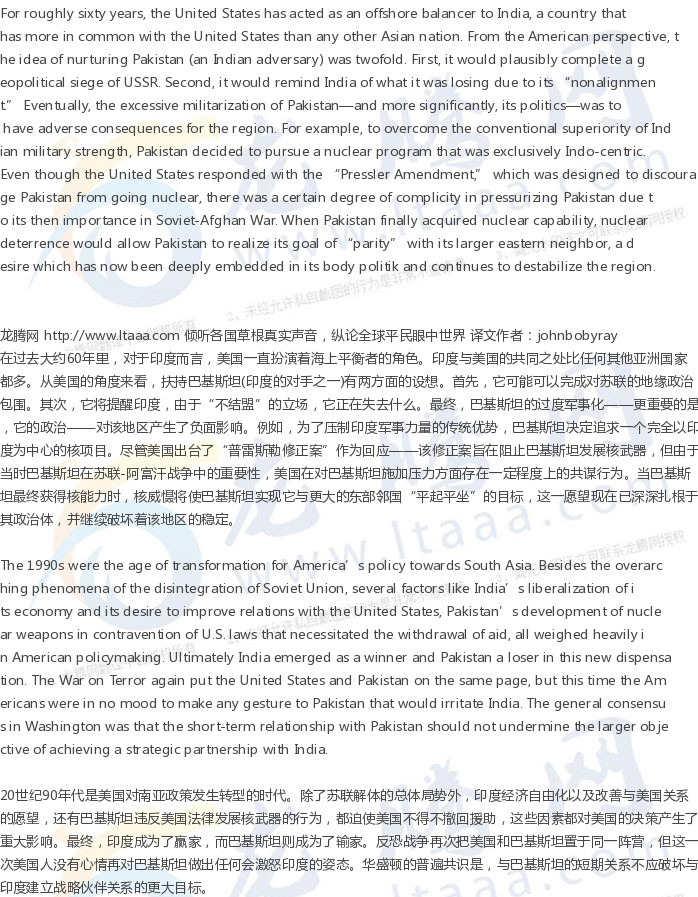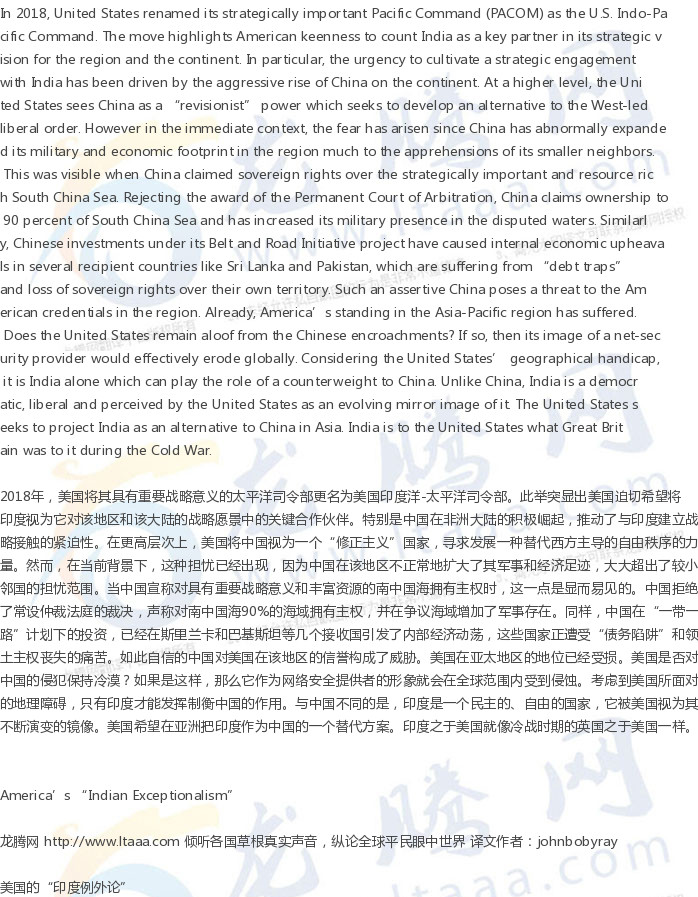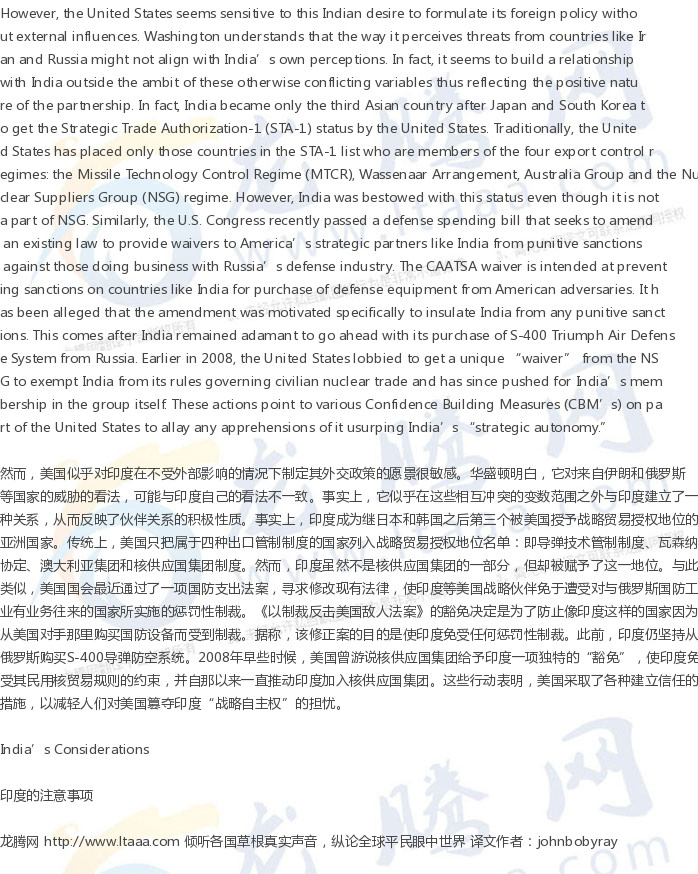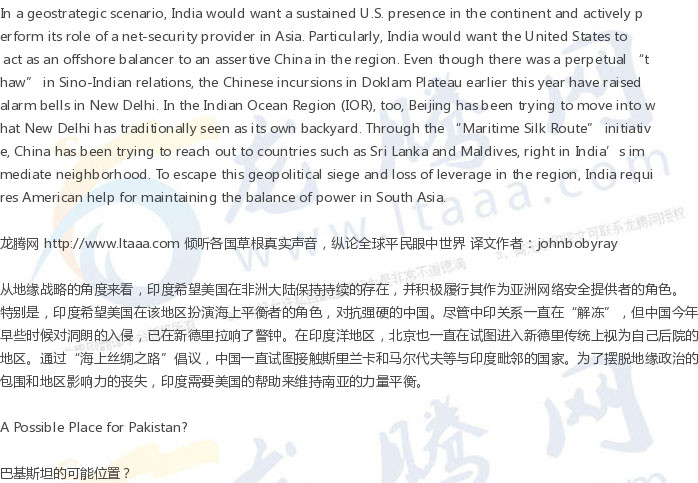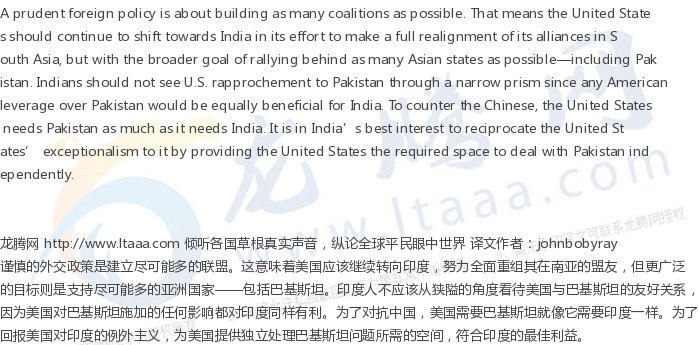为什么美国应该把印度放在第一位 [美国媒体]
美国和亚洲之间正在发展一种新的关系。在过去,由于冷战政治的缘故,美国更关心的是如何在一个不可预测的亚洲遏制苏联。不可避免的是,在一种建立在对威胁的共识而非政治观点一致基础上的关系中,一旦这些针对威胁的共识不复存在,就会出现分歧.....
Why America Should Put India First
为什么美国应该把印度放在第一位
A new kind of relationship is evolving between the United States and Asia. In the past, on account of the Cold War politics, the United States was more concerned with the containment of Soviet Union in an unpredictable Asia. It was inevitable that, in a relationship based on common perceptions of threat rather than the concurrence of political ideas, discords should mount once those threat perceptions ceased to exist. With the passing of the age of Cold War, a new dynamic has impacted the relationship between the United States and Asia. In this phase of changing relationships, Americans are exploring the similarities that unite them with some Asian countries and the differences that divide them from the others. This has given rise to several positive alliances on the continent, which are showing a higher degree of stability and prudence—unlike their Cold War counterparts. This transformation can be best understood in the context of South Asia.
美国和亚洲之间正在发展一种新的关系。在过去,由于冷战政治的缘故,美国更关心的是如何在一个不可预测的亚洲遏制苏联。不可避免的是,在一种建立在对威胁的共识而非政治观点一致基础上的关系中,一旦这些针对威胁的共识不复存在,就会出现分歧。随着冷战时代的过去,一种新的动力正在影响着美国和亚洲之间的关系。在这个关系发生变化的阶段中,美国人正在探索他们与一些亚洲国家的共同点,以及他们与其他国家的不同点。这种做法已经在非洲大陆上促成了几个积极的联盟,这些联盟与冷战时期的联盟不同,它们表现出了更高程度的稳定和谨慎特性。这种转变在南亚的背景下可以得到最好的理解。
Backdrop
背景
From the American view, unlike Pakistan, India is a natural partner and not just a client state. Epithets like “global commons,” “natural allies” and “destined partners” have been attributed to this brewing relationship. In fact, former U.S. President Barack Obama described the U.S.-India relationship as “one of the defining partnerships of the 21st century.” Cutting through the nomenclatural rhetoric, a strong U.S.-India relationship is indeed essential for both the countries. Think of all the commonalities. Shared democratic values, energy security, Islamic radicalism, the future of Afghanistan, and the geopolitical architecture of Indo-Pacific region—they all point to the growing convergences of strategic interests between the two countries.
在美国看来,与巴基斯坦不同,印度是一个天然的合作伙伴,而不仅仅是一个附庸国。“全球公共资源”、“天然盟友”和“命中注定的伙伴”等绰号,都被用于形容这种酝酿中的关系。事实上,美国前总统奥巴马描述了美印关系是“21世纪最具决定性的伙伴关系之一”。而在这种术语的修辞之下,事实则是一个强大的美印关系对两国来说都是至关重要的。想想两者所有的共性。共同的民主价值观、能源安全问题、伊斯兰激进主义、阿富汗的未来,以及印太地区的地缘政治架构,这些都表明两国的战略利益在日益趋同。
Why Do United States and India Need Each Other?
为什么美国和印度需要彼此?
Perhaps the strongest testimony supporting India’s importance to the United States is its policy of “exceptionalism” to India. As an exception to its traditional policy of engagement with partners, the United States to a large degree, has relaxed norms and policy postures for India which it generally demands from American allies. During the Cold War, India did not align itself with either of the blocs and decided to pursue an independent foreign policy. Over the years, this has given rise to a culture of “strategic autonomy” in New Delhi where foreign-policy measures are taken independent of outside influences. For example, when U.S. Permanent Representative to United Nations Nikki Haley urged India to reconsider its ties with Iran following new sanctions on Iran, India’s response was to openly abide by UN imposed sanctions and not those imposed by individual countries.
支持印度对美国所具备的重要性的最有力证据,或许是它对印度的“例外论”政策。作为与伙伴接触的传统政策的一个例外,美国在很大程度上放松了对印度的规范和政策立场,而这通常是美国盟友所要求的。冷战期间,印度没有与任何一个集团结盟,而是决定奉行独立的外交政策。多年来,这在新德里形成了一种“战略自治”的文化,其外交政策措施不受外界影响。例如,美国常驻联合国代表尼基·哈雷在对伊朗实施新制裁手段后曾敦促印度重新考虑与伊朗的关系,印度的反应是它将遵守联合国实施的制裁,而不是个别国家实施的制裁。
From the Indian perspective, a gradual alignment towards United States would work in its favor both economically and politically. One of the centerpieces of Indian foreign-policy post liberalization has been its emphasis on economic diplomacy. It aims at accelerating domestic growth by boosting foreign investment. India has both an enormous demographic potential and diverse avenues for investment. However, owing to nature of its economy, which directly leapfrogged from agriculture to the services sector, India requires foreign capital and expertise to develop its yet untapped manufacturing sector. Recent campaigns like “Make in India” point to the efforts of the Indian government directed at wooing foreign investment. With its abundant capital and technological expertise, this outreach can best be reciprocated by the United States. The two economies have the potential to work as complimentary in a sense that India’s growing middle class also offers a powerful business constituency for American companies as markets elsewhere start to dry up.
从印度的角度来看,与美国逐步结盟在经济和政治上对印度将是有利。印度外交政策后自由化的核心内容之一是强调经济外交。它旨在通过增加外国投资来加速国内经济的增长。印度拥有巨大的人口潜力和多样化的投资渠道。然而,由于印度经济直接从农业跨越式发展到服务业,印度需要外国资本和专业技术来发展尚未开发的制造业。像“印度制造”这样的行动反映了印度政府为吸引外国投资所做的努力。凭借其雄厚的资本和技术专长,美国能够最好地对这种接触作出回应。从某种意义上说,随着其他市场开始枯竭,印度不断壮大的中产阶级也在为美国企业提供了强大的商业支持,这两个经济体是有可能互补的。
Till this point, the basic premise of this essay has been to reinforce the mutual utility of an Indo-U.S. partnership. However, in such a scenario, where does Pakistan figure in America’s foreign-policy imaginations? Even during the Cold War, the United States never prepared for a policy for Pakistan in isolation from India. Only when the stakes for backing Pakistan rose enormously, would the United States antagonize India. The highpoint for Pakistan in this triangular dynamic came during the years of Johnson and Nixon presidency when Pakistan was the intermediary in the arrangement of the opening to China and the publicly stated pro-Pakistan “tilt” by United States during the 1971 war with India. Now with the transformation of American foreign policy towards South Asia, the triangle seems to be working the other way, with India and the United States cooperating against Pakistan. The more the United States integrates with India, the less relevant Pakistan will be in American foreign policy. Under Indian pressure, the United States might rescind Pakistan’s major non-NATO ally status or, at worst, designate Pakistan as a state sponsor of terrorism. This will invariably push Pakistan closer to China, which would mean bad news for both the United States and India. For the United States, Chinese gain is America’s loss. Pakistan is still a reasonable actor in the region. From its role in Afghanistan to the balance of power it brings to Asia, Pakistan’s role as a possible “swing state” cannot be underestimated. Similarly, India requires a stable western frontier in order for the United States to have considerable leverage over Pakistan.
到目前为止,这篇文章的基本前提是加强印美两国伙伴关系的共同效用。然而,在这种情况下,巴基斯坦在美国的外交政策想象中扮演了什么角色?即使在冷战期间,美国也从未准备过为巴基斯坦而采取孤立印度的政策。只有当支持巴基斯坦的收益大幅上升时,美国才会与印度对抗。对巴基斯坦来说,这种三角关系的高潮出现在约翰逊和尼克松担任总统期间,当时巴基斯坦是安排其对华关系破冰的中间人,1971年美印战争期间,美国公开宣称了其亲巴基斯坦的“倾斜立场”。现在,随着美国对南亚外交政策的转变,这一种三角关系似乎正朝着另一个方向发展,印度和美国合作对抗巴基斯坦。美国与印度的融合越多,巴基斯坦在美国外交政策中的作用就越小。在印度的压力下,美国可能会取消巴基斯坦的主要非北约盟国地位,或者在最坏的情况下,将巴基斯坦列为支持恐怖主义的国家。这必然会把巴基斯坦推向中国,这对美国和印度来说都是坏消息。对美国来说,中国的收获就是美国的损失。巴基斯坦在该地区仍然是一个合理的角色。从在阿富汗扮演的角色,到给亚洲带来的权力平衡,巴基斯坦作为一个可能的“摇摆国家”的角色不容低估。同样,印度需要一个稳定的西部边境,以便美国对巴基斯坦拥有相当的影响力。
Conclusion
结论
India’s power falls far short of what it would need to compete with China. To what extent is the United States ready to fill this power differential and build India’s trust in the United States? The answer to that question will eventually decide the fate of South Asia and beyond. The task ahead for the United States is to rally both traditional and new partners against the threats of regional expansionism by China. It needs to build a strong coalition of middle powers that can effectively resist China’s excursions in unison. India will be the common denominator in this scheme. Even though the transactions with “like” powers similar to India, Japan, and Australia would be easier, yet the U.S. administration equally needs to align with dissimilar powers like Pakistan, Iran, Bangladesh, and Cambodia to counter the Chinese expansion.
印度的实力远远不足以与中国竞争。美国准备在多大程度上填补这种权力差距,在多大程度上建立印度对美国的信任?这个问题的答案最终将决定南亚和其他地区的命运。美国面临的任务是团结传统伙伴和新伙伴,共同应对中国地区扩张主义的威胁。它需要建立一个由中等大国组成的强大联盟,从而能够以一致的步调有效抵制中国。印度将是这一计划的公分母。尽管与印度、日本和澳大利亚等“类似”国家的交易会更容易,但美国政府同样需要与巴基斯坦、伊朗、孟加拉国和柬埔寨等不同国家结盟,以对抗中国的扩张。
版权声明
我们致力于传递世界各地老百姓最真实、最直接、最详尽的对中国的看法
【版权与免责声明】如发现内容存在版权问题,烦请提供相关信息发邮件,
我们将及时沟通与处理。本站内容除非来源注明五毛网,否则均为网友转载,涉及言论、版权与本站无关。
本文仅代表作者观点,不代表本站立场。
本文来自网络,如有侵权及时联系本网站。
图文文章RECOMMEND
热门文章HOT NEWS
-
1
Why do most people who have a positive view of China have been to ...
- 2
- 3
- 4
- 5
- 6
- 7
- 8
- 9
- 10
推荐文章HOT NEWS
-
1
Why do most people who have a positive view of China have been to ...
- 2
- 3
- 4
- 5
- 6
- 7
- 8
- 9
- 10

